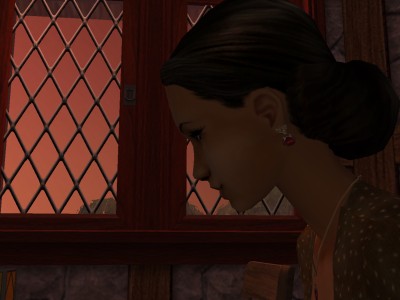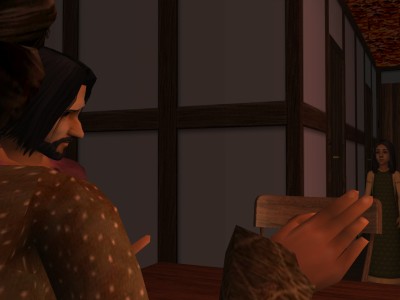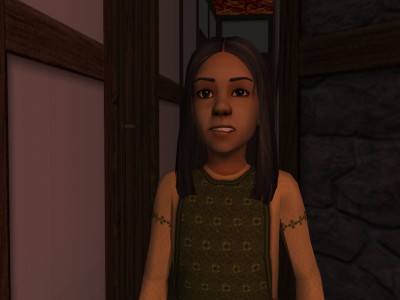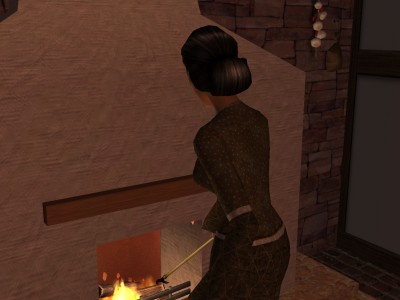
Gunnilda folded her towel and laid it away with a sigh too weary even for any hint of satisfaction. She brushed off her dress and smoothed her hair – exhausted as she was, the habit was by now too firmly ingrained to be neglected – and then sat at the table, folded her arms across her chest, and closed her eyes. Only for a moment, she promised herself. But she had earned it.
Aelfie was expecting another baby in the summer. She hadn’t yet grown heavy with it, but when Aelfie had complained that she felt one of her “spells” coming on, Gunnilda had sent her home and done her work in her place.
Credulous though he usually was, Alwy did not set much stock by Aelfie’s “spells” – not when they meant more work for his wife. But Gunnilda was an easy mistress, and had known, moreover, what it was to carry the double burden of a coming child in the belly and a lost child weighing on the heart.
Aelfie, at least, had that child to look forward to, Gunnilda thought. Her own arms ached for a baby to hold.
She rocked to and fro, her arms wrapped tightly across her breast, her eyes shut tightly against the slanting February light. She did not rock slowly, as if to soothe a baby, or even herself. She rocked quickly, in time with her heart. By easing herself into its rhythm, she hoped to prevent it from shaking her apart, just as Alwy had explained when he had tried to teach her how to ride the mare at a trot. She had not yet mastered either, but from the mare, at least, she could always dismount. To live with her heart she would have to learn.

The freshly-scrubbed bricks of the hearth were baking dry in the heat of the fire, and their wet odor lay on her tongue like a salty stone, beneath which was the savory smell of the bean soup that had simmered on the back of the stove since just after dinner. And in her nose was the smoke of cherry wood, which she loved.
When he rose early enough to prevent her from seeing him bring in the wood, it was one of Alwy’s favorite tricks to build up a fire of maple to beguile her, and then go out and leave her with nothing but cherry to add throughout the day. He thought himself so sly that Gunnilda doubted he realized she guessed his stratagem. She was happy she did, for it meant that the mere odor of cherry smoke could make her feel loved, even coming from another chimney than her own.
Someday she might even manage to tell him so.

She opened her eyes as William began to bark down behind the barn. She had only meant to sit a moment, but she found her eyes dazzled by the sudden light, though it had mellowed meanwhile into the pink of approaching evening.
William’s barking stopped suddenly. The big dog had recognized someone he knew.
If William was out, then it meant Alwy had not yet returned. And if William had met someone behind the barn, then it was probably someone coming up from Nothelm castle. She hoped it would be Bertie, or at least the Duke. In either case, she was happy she had had a generous hand with the ham when she had prepared the soup.
She rose and gave it a quick stir while she awaited the visitor’s arrival. She hoped it was not merely one of the hands looking for Alwy, though it was the most likely explanation. Her heart ached with emptiness, and she would have liked a visitor that would sit a while, and talk with her, and make her forget herself for a time…

She was stirring up the fire when the visitor climbed the steps and passed the window, so she was quite unprepared when she opened the door to the knock and found Egelric standing on the step. She could never remember afterwards whether she had even spoken a greeting to him, or had only stared.
“Good day, Gunnilda,” he said in a low voice.
“Alwy isn’t here,” she stammered.
“I know. I met him. I came to see you,” he said. “That is – I would – if you will see me.”

There was no apology in his voice, no guilt in his face, only the weary resignation of a boy who has been whipped so many times for crimes he has and hasn’t committed that he no longer sees any difference between them. But of course, she thought, that was the sort of boy he had been.
“Come in,” she said. “Won’t you take off your cloak and have a chair?”
He stepped in after her and busied himself with removing his cloak. He went to hang it on the peg, and she saw him hesitate a moment before the old plaid. And then he hung his cloak atop it.
She lit the lamp, and they sat together, but she did not speak. She thought of things the Duke had said to her, and did not think it wise.
Egelric only stared at the lamp for a while, his forearms and hands limp upon the surface of the table, and his face seeming somehow limp as well. Now her heart ached for him, but she was too in awe of him to rock herself to peace with it.

“I don’t know whether it matters to you,” he finally said in the same dull voice. “I don’t know whether you will believe me. They are only words.”
He spoke with the flat, halting cadence he used to have when he read aloud to Bertie to help him with his lessons. It made her think that he was only repeating something he had learned.
“I came to tell you that… I am sorry… about your baby.” He dragged his gaze from the lamp and turned it on her.

She only nodded, struck dumb by the despair in his eyes.
“I should also tell you I am sorry… for what I did not long ago, but I don’t want to. Because I’m not. I’m not sorry, because…” He paused a long while, still staring at her, and then, like a boy who knows that his excuses won’t make a difference in the whipping, muttered simply, “Because.” He looked back at the lamp, and his face and arms went limp again.
Gunnilda let out the breath she did not know she had been holding. She had no idea he had come to this. Was the Duke blind? How could one “lose patience” with a man in such a state? One did not “lose patience” with a dying man for the troubles occasioned by his failing health. It made no more sense to lose patience with a man who was so sick in his soul.
It seemed tragic, the way his brows drooped heavily over his eyes, the way his eyes lay deep in a smudge of shadow, the way his skin stretched thin and tight over the arch of his nose and lay slack over his cheeks, and the way his mouth fell into a sort of frown out of sheer lassitude. All that had been fine and flashing in him had fallen into decay.

Most tragic of all seemed to be the hands that lay on the table – not palms-downward to steady him, not palms-upward in a deliberate gesture of surrender or appeal, but heavily on their sides with the fingers hanging limp, like a pair of dead animals whose limbs lay where last they fell.
His hands had always fascinated her, the way the hands of a strong and capable man will fascinate such a woman. It was something to slip one’s hand trustingly into another hand strong enough to snap one’s bones. And those hands knew how to do – and had done – so many things! They had built and broken and sown and braided and written and bathed and steadied and – so many things! And now they were dead, and the thumbs and the fingers of the hands curled lifelessly around the palm, the way a dead animal will lie slightly curved around its belly.
Without thinking, she laid one of her own hands over his and was almost surprised to find it warm and alive.

Her small hand slipped easily into the space between his thumb and his curving fingers, and her fingertips found his palm. Her thumb reassured itself of the solid knuckles, of the tendons across the back of his hand, of the dark hair on the backs of his fingers. Her fingertips explored the creases of his palm and found the calluses of reins, of sword hilts, of other things she could not guess.
His hands were not dead. They still worked, still knew how to work, and in the faint play and spring of the muscles she could tell that they were still strong. They were merely waiting to die.
He still stared at the lamp, and for a while he gave no sign of noticing her hand, or even her presence. But gradually she realized that his fingers had been curling closer around hers until finally he had pressed her fingertips into his palm and she could move them no more.
They sat a while thus, and neither spoke, and the fire and the sun burned low.

He stared at the lamp, and she looked at his profile. It, at least, had changed little, and it shone out against the shadow of the hall, as ruddy and as noble in the twilight as the face on a gold coin.
She wondered whether it was possible for any of her strength to go into him, though an hour ago she would have been surprised to learn that she had any strength left to give. He was not the visitor she had been expecting, but she had forgotten herself after all.

And then a door at the end of the hall opened suddenly, and Wynna came running. “Ma! Beddy has – oh!” She pulled up short just before the kitchen.
Egelric released Gunnilda’s hand and turned towards the hall. “Hallo, Wynna,” he said politely.
“Hallo,” Wynna muttered after a moment.
“What is it, Wynn?” Gunnilda asked, trying to keep the annoyance from her voice.
“Ma, Beddy hit his head on the edge of the bed and it’s starting to swell.” She glanced dubiously at Egelric as she spoke.

“Oh, for the love of heaven!” Gunnilda huffed as she rose. “Was he jumping off the bed again?”
“I couldn’t get him to stop.”
Egelric pushed back his chair and stood as well.
“Don’t – ” she gasped. “Stay a while. I mean – won’t you stay for supper?”
“I’m sorry, I can’t,” he said in the dull, low voice.
“Well, I – I hope you can come again soon,” she said.
He stared at the plaid cloak while he pulled on his own. “Aye,” he said, but she did not think he meant it.
“Ma!” Wynna whined.

“Just a moment!” Gunnilda said, trying to hold back tears of frustration.
“Good evening, ladies,” he said, and he opened the door and slipped outside without waiting for a reply.
“What’s he doing here?” Wynna cried as soon as he had disappeared around the corner of the house. Gunnilda did not like the way she said “he.”
“Well,” she snapped, “I don’t know, but I guess it isn’t the first time he ever come here!”
“What’s he doing holding your hand?”

“Can’t he, then, if he’s my friend? Who do you think you are, little mistress, to be asking your elders what they’re doing?”
Wynna glowered at her for a moment before turning and stomping back to her room, wherein Bedwig could be heard giggling despite the bump on his head.
William began barking again, but it was his joyous bark of welcome that meant that Alwy was coming up the hill.
Gunnilda went to the fire and began to stab at it with the poker as if it were a beast to be slain. Suddenly she hated the smell of cherry smoke.








*Sigh* Poor Gunnilda.